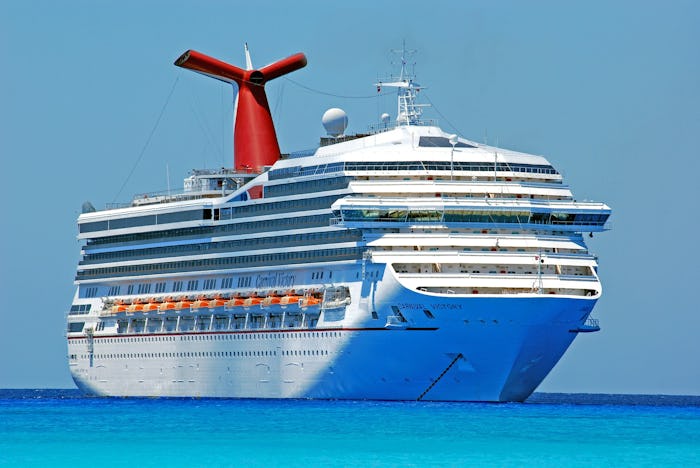Just because you're traveling, doesn't mean you have to stop breastfeeding. In most cases it simply requires a little prep work in advance, but nothing too challenging or daunting. Since summer is (almost) here and many families opt to sail the high seas, learning about the things to know about breastfeeding on a cruise before you go should be on the top of your to-do list.
As a new mom, preparation is the name of the game. Making special arrangements won't be necessary for your sea trip, but a little forethought can go a long way. For cruises especially, a little prep work is recommended for extra smooth sailing. The areas you may want to focus on specifically are pre-boarding security procedures and proper breast milk storage. If you have both of those areas covered, everything else will be simple. Beyond that, acquainting yourself with the cruise line's guidelines and policies is also a good idea.
Additionally, depending on whether your baby is with you for the cruise or not, there may be some very specific things to consider and address before you board. Here are seven things you'll want to think about before you get on a cruise ship as a breastfeeding mother.
1Breastfeed On Demand If Baby Is With You
Just like flying, being on a cruise ship can be very stimulating and sometimes overwhelming for a baby. To help with that, author and international board certified lactation consultant with Tiny Tummy Lactation Services Tori Sproat tells Romper that moms should nurse on demand.
"You may find your baby is nursing more frequently on your vacation and the reasoning is two-fold," she says. "There's a lot of new experiences and baby gets comfort from nursing and many cruises are in more humid and warm climates so human milk is hydrating for them."
2Make Room For Your Baby
While babies are small, the things they require to travel are not.
"Make sure you choose a cabin that is large enough to accommodate your baby and their gear," Gina Cicatelli Ciagne, a certified lactation consultant, tells Romper. She also suggests, that you "think ahead about those nighttime feedings and try to position baby’s sleeping area is in close proximity to you."
3Know Your Rights
There have been stories in the news over the past few years about women on cruise ships being told they couldn't breastfeed. But that's total bull. Many cruise lines have breastfeeding clauses built into their policies, like this one from Carnival Cruise which states:
"Nursing mothers have the right to breast feed in public or private areas and are not required to cover themselves while doing so. This policy is consistent with state law in 49 states in the U.S."
4Check Local Laws In The Countries You're Visiting
You're protected by law to breastfeed where you want in the United States, but outside is questionable depending on where you're going.
"Check out local laws related to breastfeeding for the countries where you will be docking and visiting," Ciagne suggests. "A nursing shawl or cover-up can be convenient in these situations as well."
5Bring Supplies If You Plan On Using On Board Child Care Services
Many cruise lines have on board babysitting services. If you want to use them at any point during your trip, you'll just need to do a little prep work.
"Should you take advantage of any infant care services on board, you'll need a hand pump and one to two bottles to bring with you for the separation," Sproat says. "Most cruise lines will have facilities to help you clean these supplies, thankfully. You shouldn't need a full pump set if baby is with you."
6Stored Breast Milk May Need To Be Screened By Security Officials
If you're bringing breast milk or formula on board a cruise ship it may need to be checked by members of the Transportation Security Administration (TSA), per the organization's guidelines on the website. If you don't want the breastmilk or formula opened, you can opt to have it screened by X-ray if available. The best thing to do is to alert an agent that you have these items before the screening process starts.
7Pump If Baby Is Not With You
"If baby is not with you, you'll need to pump in preparation for departure," Sproat says. "The easiest way to do this is to pump after morning and bedtime feeds in the weeks leading up to departure."
She also recommends that breastfeeding moms bring their pumps on the cruise and says, "You will need to pump every three hours to maintain supply," she says. "Hand expression during your excursions will help you off of the boat."
8Ask About Storage Ahead Of Your Trip
Sporat suggests calling your cruise lie in advance to see if you have a freezer to store the milk. Another thing to keep in mind is that, although many cruise lines have mini-fridges in the room, these are often not cold enough to safely store milk, as noted on the Traveling Mom website. It's suggested that you talk to your cabin steward about getting a larger fridge for medical purposes or storing your milk in a central fridge.
9You're Allowed To Bring A Personal Cooler
If you want to keep milk cool for off-boat excursions, you may want a personal cooler with you. Per the TSA website, "ice packs, freezer packs, frozen gel packs, and other accessories to cool formula, breast milk, and juice are allowed in carry-on." The coolers permitted on cruises have to be personal size (not large, or oversize). Each cruise line has their own dimension specifications so it's best to check ahead of time.
Traveling as a breastfeeding mother isn't impossible, it just takes a little more advanced planning. Creating memories on a cruise trip is certainly a beautiful experience whether you're with your baby or not. As long as you're privy to a few of these things before you leave, it should be smooth sailing.
